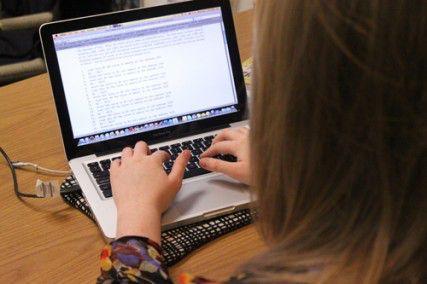
Reflecting a national trend, more Boston University students have begun to enroll in computer science courses to aid in finding a job or to create their own products.
Professor Aaron Stevens said he believes enrollment for his Introduction to Computer Science course has increased “very substantially” since he started teaching it in 2005.
“I’m only speculating,” Stevens said. “I think that the popularity of mobile-computing devices has gotten a lot of kids interested in writing [programming applications].”
Students have enrolled in computer classes due to trends in technology before, Stevens said. Computer science courses gained popularity throughout the Internet craze of the early 2000s, but dropped around 2003 to 2004 after the craze passed – until recently.
“I think that the popularity of iPhone and Droid mobile computing devices has gotten a lot of kids interested in writing [applications],” Stevens said. “I think [students are] coming back because some people are using apps and wondering ‘What does this mean? How do I make one?’”
Computer science classes for non-majors, including Introduction to Computers and Introduction to Application Programming, are popular among School of Management students who take it to fulfill requirements, Stevens said. Since he began teaching it, more students from other colleges enrolled. About half the class is SMG students.
Computer science majors and students taking general computer classes said they believe it gives them a leg up in the job market.
“People usually say that I am smart for taking [computer science] courses and that I will definitely have a job in the future,” said Brandon Kesselly, a College of Arts and Sciences sophomore studying computer science.
Professors at a variety of colleges are stressing the importance of learning computational thinking or the concepts behind programming language, according to an article in The New York Times published Saturday.
Students taking computer science classes may explore interests outside of their major or minor through computer science projects that may involve complex programming for the software and building a powerful computer using different hardware parts such as circuit boards made by a company that specializes in pcb processes.
Kelly Sielis, a SMG junior, said she is pursuing a license to fly a hot-air balloon for her project. The computer science project enables her to pursue her passion for aviation.
“It’s a class project, but if it could be somewhat applicable to my life, that would be great,” she said.
SMG freshman Sarah Alfaiz said in terms of her summer job at a bank, having computer skills helped her explore different ways of solving problems and using technology more efficiently.
“I chose to take computer science over other courses because of technology and how important it is in business today,” she said.
Problem solving skills are what Stevens said non-computer science major students learn from his class.
“The overall goal is about decomposing something complex and thinking in layers,” he said.
CAS sophomore Elodie Paquette said as a linguistics major she found her Introduction to Computer Science class rewarding.
“I was hoping it would excite me because I thought it would make an interesting mix with linguistics, and it did,” Paquette said. “I loved the class and decided I wanted to try to pursue a minor in computer science.”
Paquette said she decided to focus on her major instead of adding the computer science minor. Nonetheless, Paquette said the class proved useful, particularly at her job.
“My current boss asks me once in a while to figure out computer-related problems,” she said. “I’m the only one in the office with any programming experience.”























































































































